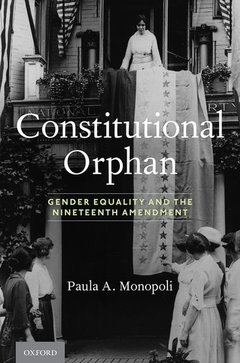Constitutional Orphan Gender Equality and the Nineteenth Amendment
Langue : Anglais
Auteur : Monopoli Paula A.

In Constitutional Orphan, Professor Paula Monopoli explores the significant role of former suffragists in the constitutional development of the Nineteenth Amendment the woman suffrage amendment ratified in 1920. She sheds new light on the connection between the suffragists as institutional actors in civil society and the emergence of a "thin" conception of the Nineteenth Amendment as a mere nondiscrimination in voting rule, rather than a robust equality norm. In this compelling legal history, Monopoli illuminates how the Nineteenth had implications for federalism, women's citizenship and the definition of equality, as well as how gender, race and class intersect to affect our constitutional development. Monopoli explores the choice by both the National Woman's Party and the National American Woman Suffrage Association to turn away from African American suffragists who were denied the vote even after ratification of the Nineteenth Amendment. Using original sources, legislative history and case analysis, she develops a persuasive theory connecting that moral and strategic failure to the emergence of a narrow interpretation of the amendment. Monopoli also evaluates the impact of class divisions among former suffragist allies. These divisions around support for the NWP's Equal Rights Amendment, found social feminists opposing that "blanket" amendment for fear of its impact on the constitutional validity of protective labor legislation for working-class women. Monopoli details how many state courts, left without federal enforcement legislation to guide them, used strict construction to cabin the emergence of a more robust interpretation of the Nineteenth Amendment, as a broad equality norm. She concludes with an examination of new legal scholarship that suggests ways in which such a robust understanding of the Nineteenth Amendment could be used today to expand gender equality. In this compelling legal history, Monopoli illuminates how gender, race and class intersect to affect our constitutional development.
Paula A. Monopoli is the Sol & Carlyn Hubert Professor of Law at the University of Maryland Carey School of Law. An elected member of the American Law Institute, Professor Monopoli received her B.A. from Yale College and her J.D. from the University of Virginia School of Law. In addition to Constitutional Orphan, Professor Monopoli is the author, editor and co-author of three previous books, American Probate, Law and Leadership, and Contemporary Trusts and Estates, as well as a number of articles including Gender and Constitutional Design in the Yale Law Journal. She has been a Visiting Scholar at the Moller Institute, Churchill College, University of Cambridge, and is an Academic Fellow of the American College of Trust and Estate Counsel.
Date de parution : 10-2020
Ouvrage de 256 p.
23.6x16 cm
Thèmes de Constitutional Orphan :
© 2024 LAVOISIER S.A.S.



